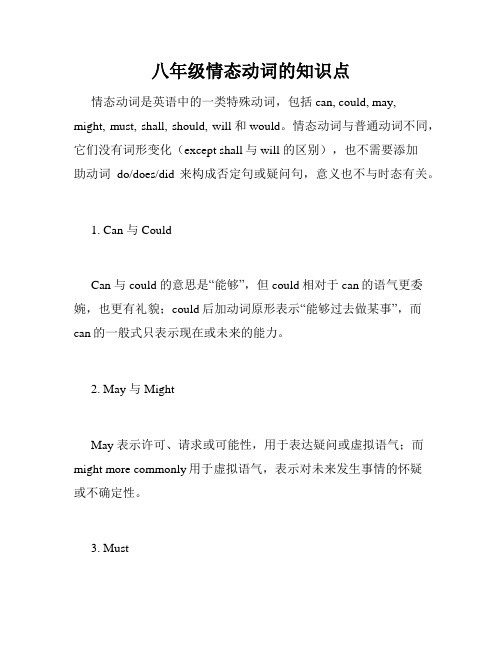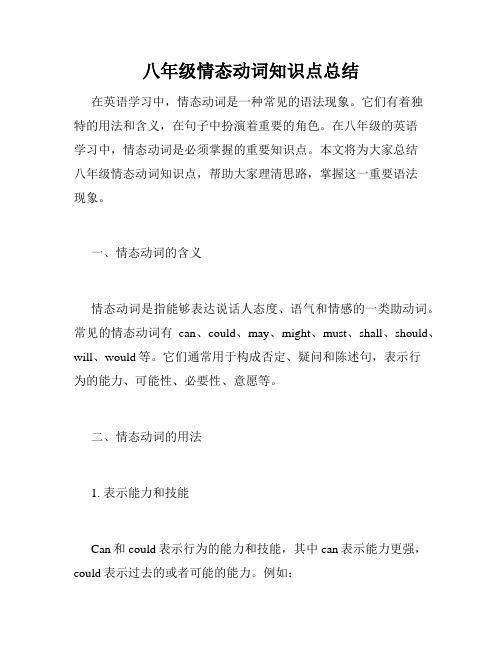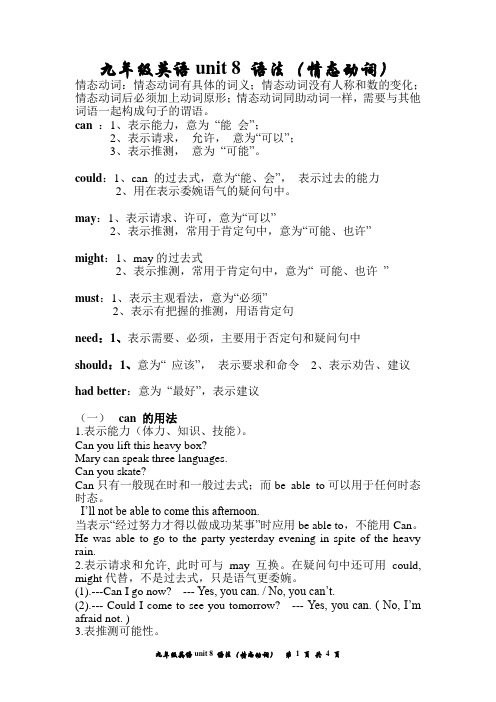第八次课 情态动词
情态动词课件

• 5.You ________do it if you really don't want to. • A. needn't B. mustn't C. can't D. couldn't • [答案]A。[解析] 考查情态动词。本题应由句意人 手破解。如果你不想做的话,你“没有必要”做 它,所以正确答案为A项。 • 6.--May I do the rest of the work tomorrow? • --Yea, of course. You ___________finish it today. • A. must B. mustn't C. needn't • [答案]C。[解析]思路分析:根据句意可知, needn’t不必
一、情态动词是什么?
实义动词
能够独立做谓语
系动词
助动词
不能独立做谓语
情态动词
掌握情态动词的定义:表示可能、怀疑、允诺、 愿望、义务、必要、猜测等的动词是情态动词。
二、常考的情态动词
1. 2. 3. 4. 5. can能; 可能---could may可以-must必须;一定 need需要 should---应该
重难点解析
1
பைடு நூலகம்
怎样选用can和may 情态动词can和may都能表示“可能性”。如: He may be right. 他可能对。 He can’t be right. 他不可能对。 那么,在表示可能性这个概念时,二者的区别是什么呢?
重难点解析
二者所适用的句子类型不同。一般说来,can多用于疑问 句和否定句,表示怀疑或不相信等态度;而may则多用于 陈述句(肯定),表示一种揣测。如: Can it be true? No, it can not be true. Where can they be now? I hear there may be a few copies left. What he said may not be right.
八年级情态动词的知识点

八年级情态动词的知识点情态动词是英语中的一类特殊动词,包括can, could, may, might, must, shall, should, will和would。
情态动词与普通动词不同,它们没有词形变化(except shall与will 的区别),也不需要添加助动词do/does/did来构成否定句或疑问句,意义也不与时态有关。
1. Can 与 CouldCan 与could 的意思是“能够”,但could相对于can的语气更委婉,也更有礼貌;could后加动词原形表示“能够过去做某事”,而can的一般式只表示现在或未来的能力。
2. May 与 MightMay 表示许可、请求或可能性,用于表达疑问或虚拟语气;而might more commonly用于虚拟语气,表示对未来发生事情的怀疑或不确定性。
3. MustMust强调必须、不可避免,表示绝对肯定或高度推断;用于表达命令或建议,以及对情况的强烈表示。
4. Shall 与 ShouldShall 和should用于表达命令、请求或建议,但shall主要用于将来时,而should则是一种情态动词,强调道义义务和道义要求,较具有礼貌和客观性。
5. Will 与 WouldWill 表示将要发生的事情,也表示愿望或决心;Would则常用于虚拟语气和条件句,表示假设、愿望或敬语。
6. Can与May的用法差异Can 表示某人能够做某事,能力在第一位。
而may则强调许可、允许的意义,是语气委婉的表达方式。
7. Should与Would的用法差异Should是一种道义上的情态动词,引申出一定的礼貌和可能性;而would则更多地表示愿望和推测,即假设的语气。
8. Must 和Have to两者不同点:must是限定词,have to 则比较口语化,常用于口语中;must表示主观推断,而have to则表示客观事实。
9. 动词原型与情态动词连用情态动词和动词原形连用是比较常见的用法。
八年级英语中情态动词的用法归纳总结

1.情态动词可以用来表示能力和才能:- Can:表示能力和可能性。
例如:I can swim.(我会游泳)- Could:表示过去的能力和可能性。
例如:When I was young, I could run very fast.(我小的时候跑得很快)2.情态动词可以用来表示请求和许可:- Can:表示请求、许可和推测。
例如:Can I borrow your pen?(我可以借你的笔吗?)3.情态动词可以用来表示建议和意愿:- Should:表示应该、建议和责任。
例如:You should study harder.(你应该更加努力学习)- Would:表示愿意、请求和建议。
例如:Would you like some tea?(你想要一些茶吗?)4.情态动词可以用来表示可能性和推测:- Might:表示可能性和推测。
例如:It might rain tomorrow.(明天可能会下雨)- May:表示可能性和推测。
5.情态动词可以用来表示义务和必须:- Must:表示义务和必须。
例如:We must finish our homework.(我们必须完成作业)- Should:表示应该和期望。
例如:You should apologize to her.(你应该向她道歉)总结起来,八年级英语中的情态动词有can, could, may, should, would, might和must,它们可以表示能力、请求、许可、建议、意愿、可能性、推测、义务和必须。
不同的情态动词在不同的语境下有不同的用法和含义,所以需要根据具体语境和意图进行准确使用。
新目标英语九年级Unit 8 情态动词复习讲解课件

➢ 典型例题解析
【例3】— Where's Mr Li? I have something important to tell him.
— You ____ find him. He __C____ Japan. A. may not, has gone to B. may not, has been to C. can’t, has gone to D. can't, has been to
Mum: Who is it? Jim: (一定是Tom。)
It must be Tom. (可能是Kate。) It might/ could be Kate. (绝对不是Marry。)
It can’t be Marry.
She is in China.
Mark
-Whose football is this ?
➢ 典型例题解析
【例1】 -- Jim is reading a book under that tree. -- It __C___ be Jim. He has gone to Hainan.
A. may B. mustn’t C. can’t D. could
➢ 典型例题解析
【例2】 -- Where are you going this month? -- We __C___ go to Xiamen, but we’re not sure.
Whose dog is this?
It might / could be___.
It must be Zhang Han’s.
He is a basketball player. Whose car is this?
Unit 8 知识点

Unit 8 It must belong to Carol.情态动词must, may/might, can/could表示推测的用法。
1.mus t表示说话人对事物的推测的可能性的程度非常大,含有―一定;准是‖的意思。
―must be+表语‖表示对现在情况的推测,意为―一定……‖。
―must be+现在分词‖表示对说话瞬间(或现在)情况的推测,意为―一定正在……‖。
―must2.may.could.might表示推测,语气没有must强,意为―也许;或许‖,may not意为―也许不‖。
might是may的过去式,表示说话人对现在或将来不太确定的可能性的推测。
3.,can’t意为―不可能‖。
―can/can’t+表语‖表示对现在情况的推测,意为―(不)可能……‖。
could是can的过去式,表示说话人对事物的推测,可能性比can小,语气较委婉。
—Listen. Carol is singing in the next room. 听,卡罗尔正在隔壁唱歌。
典例题解〖例1〗—What’s Tom going to do next Sunday?—I’m not sure. He ______go to the country to see his uncle.A. canB. mustC. willD. may〖例2〗—Whose magazine is this?—It ______Carol’s. It has name on it.A. might beB. cant beC. could beD. must be〖例3〗– Jill looks so painful, there ____ the something wrong with her.-- Oh dear! We’d better take her to the nearest hospital at once.A. canB. shouldC. wouldD. must〖例4〗You ____ be tired after working for eight hours without a rest.A. canB. mayC. mustD. need〖例5〗---Are you going to Beijing by plane?---It’s fast ,but expensive. So I am not sure. I____ take a train.A. shouldB. mayC. mustD. willSection A1、Whose volleyball is this?Whose “谁的”,一般放在名词前作定语,既可以做特殊疑问词提问特殊疑问句,也可作为定语从句的引导词。
八年级情态动词知识点总结

八年级情态动词知识点总结在英语学习中,情态动词是一种常见的语法现象。
它们有着独特的用法和含义,在句子中扮演着重要的角色。
在八年级的英语学习中,情态动词是必须掌握的重要知识点。
本文将为大家总结八年级情态动词知识点,帮助大家理清思路,掌握这一重要语法现象。
一、情态动词的含义情态动词是指能够表达说话人态度、语气和情感的一类助动词。
常见的情态动词有can、could、may、might、must、shall、should、will、would等。
它们通常用于构成否定、疑问和陈述句,表示行为的能力、可能性、必要性、意愿等。
二、情态动词的用法1. 表示能力和技能Can和could表示行为的能力和技能,其中can表示能力更强,could表示过去的或者可能的能力。
例如:He can swim very fast.(他游泳很快。
)She could play the piano when she was young.(她小时候会弹钢琴。
)2. 表示推测和可能性May、might和could用于表示可能性和推测,其中may表示可能性更大,could表示可能性更小。
例如:It may rain tomorrow.(明天可能下雨。
)He might be at home.(他可能在家里。
)3. 表示必要性和义务Must表示强制性的必要性,should表示建议性的必要性,其中must用于肯定句和疑问句,should用于陈述句中。
例如:You must wear a seatbelt while driving.(开车时你必须系上安全带。
)You should eat more vegetables.(你应该多吃蔬菜。
)4. 表示意愿和请求Will、would和can用于表示意愿和请求,其中will和would用于陈述句和状语从句中,can用于疑问句和请求。
例如:He will help me with my homework.(他会帮我完成作业。
九年级英语unit 8 语法(情态动词)A4

九年级英语unit 8 语法(情态动词)情态动词:情态动词有具体的词义;情态动词没有人称和数的变化;情态动词后必须加上动词原形;情态动词同助动词一样,需要与其他词语一起构成句子的谓语。
can:1、表示能力,意为“能会”;2、表示请求,允许,意为“可以”;3、表示推测,意为“可能”。
could:1、can 的过去式,意为“能、会”,表示过去的能力2、用在表示委婉语气的疑问句中。
may:1、表示请求、许可,意为“可以”2、表示推测,常用于肯定句中,意为“可能、也许”might:1、may的过去式2、表示推测,常用于肯定句中,意为“ 可能、也许”must:1、表示主观看法,意为“必须”2、表示有把握的推测,用语肯定句need:1、表示需要、必须,主要用于否定句和疑问句中should:1、意为“ 应该”,表示要求和命令2、表示劝告、建议had better:意为“最好”,表示建议(一)can 的用法1.表示能力(体力、知识、技能)。
Can you lift this heavy box?Mary can speak three languages.Can you skate?Can只有一般现在时和一般过去式;而be able to可以用于任何时态时态。
I’ll not be able to come this afternoon.当表示“经过努力才得以做成功某事”时应用be able to,不能用Can。
He was able to go to the party yesterday evening in spite of the heavy rain.2.表示请求和允许, 此时可与may互换。
在疑问句中还可用could, might代替,不是过去式,只是语气更委婉。
(1).---Can I go now? --- Yes, you can. / No, you can’t.(2).--- Could I come to see you tomorrow? --- Yes, you can. ( No, I’m afraid not. )3.表推测可能性。
人教版九年级Unit8 情态动词表推测讲解(共20张PPT)

A. can go C. may have gone
B. may go D. must go
典例精析
3. — Where is Bill? — He___D____ in the library now.
A. can read B. may read C. must read D. might be reading
e.g. He must be American. The book could be Mike’s. She may be a Chinese. She can’t be a teacher.
知识讲解
二、情态动词表推测的不同时态
1. 情态动词 + 动词原形 → 将来
e.g. She must arrive before 5. Paul might go to Shanghai next month.
知识讲解
③ could / might 也许,或许; (把握较小) e.g. Peter could / might have gone to Beijing. I’m not sure.
④ can 表示理论上的可能性 e.g. Smoking can cause cancer.
知识讲解
2. 否定句: may not / might not, can’t / couldn’t ① may not / might not 可能不; (把握很小) e.g. It’s Sunday. He may / might not be at home.
典例精析
1. —(海南中考) Mr. Zhou can’t find his ID card anywhere. It___C___be lost.
- 1、下载文档前请自行甄别文档内容的完整性,平台不提供额外的编辑、内容补充、找答案等附加服务。
- 2、"仅部分预览"的文档,不可在线预览部分如存在完整性等问题,可反馈申请退款(可完整预览的文档不适用该条件!)。
- 3、如文档侵犯您的权益,请联系客服反馈,我们会尽快为您处理(人工客服工作时间:9:00-18:30)。
情态动词:情为何物之情态动词~
1,推测(对现在,未来的推测)
练习案例:
It ——be my mother. because someone is knocking at the door, and mom always go back home at this time(mom is not at home)
2,It——be my mother(mom is at home),someone is knocking at the door
黄金规律:can 无肯定may无疑问;Must只能用于肯定句,不能用于否定疑问句;
could全部都可以;must 70%;can/could;may/might 40%;may not/might not可能不20%;can’t/ could not 0%
需要注意的是might不是may的过去式,同理:could也不是can 的过去式
练习:
1,the cake is very sweet, you ——put a lot of sugar.
2,It——be very expensive, I never dream of buying it
3,It ——be correct.(做单选题并不完全确定这个前提)
4,She looks very happy,she——have passed the examination. A, should B,could C,must D might
5,Helen——go on the trip with us, but she isn’t very quiet sure A, should B,may C,must D can
3,定义:四个基本定义
1,Can:I can swim(表示能力);
2,Can the man be his father(表示可能)could是它的同义词;
3,Can I come in?(表示允许),could是can的委婉语气.
Could I come in?不认识的人表礼貌
4,May:表示可能(might,can,could);表示允许的语气(may,might)
Can I come in? could I come in? may I come in? might I come in? (越来越委婉) 回答全部用can回答
Must: it must be his mother(表示一定);
must you leave now?(表示必须,与have to同义词)
4,Need:(表示需要,必要)做实意动词和情态动词
练习:他明天需要来(情态动词相当于can)
He need come tomorrow
He needn’t come tomorrow
Need he come tomorrow?
他明天需要来(实意动词相当于want)
He needs to come tomorrow.
He doesn’t need to come tomorrow
Does he need to come tomorrow?
1,Could you tell me? —————
A, where she lives? B, where she lived?
2,Could I know your name? yes you ————
A,could B,can
3,if you are not careful in the street, a car——hit you
A, can B, may C, should D, must
4,问答
Must与can’t的区别:
Must不能用于否定和疑问,但是can’t 可以,所以是它的替身You have been travelling all day. You——be very tired
The restaurant——be very good. It’s always full of people
That restaurant——be very good. It always empty.
Must 与have to的区别
现在时中,must表示主观,have to 表示客观,不得不
I ——get up early at 6 o’clock tomorrow morning
In china many children—— wear uniform when they go to school. She is really nice person. You —— meet her.
He ——have English online course on every Saturday evening.
过去时中,只用had to
Last night Tom became ill, we——call him today.
四大词的肯定否定句中的回答:
Can: can/can’t
May:can/ can’t,
Must: must/ needn’t
Need: must/ needn’t
练习:
May I watch tv for a while?
No, you ——. You have to finish your homework first! A, shouldn’t B, needn’t C, mustn’t D, won’t。
